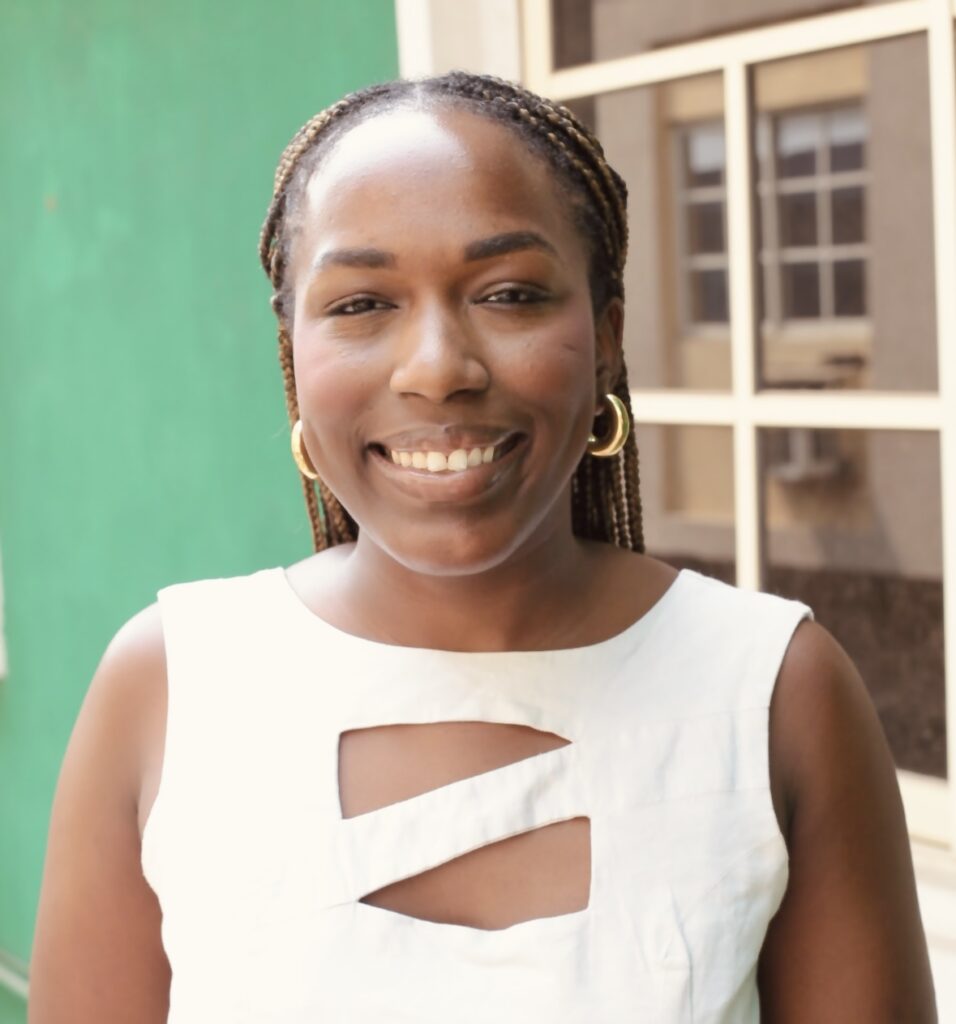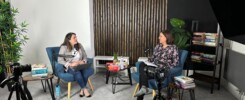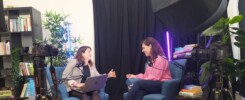By Blessed Smith
Scooped up by the BBC directly after finishing a bachelor’s degree, Hannah Ajala’s accomplishments are the result of raw talent, skills and dedication. The established broadcast journalist and founder of ‘We Are Black Journos’, Hannah Ajala sits down with Wempower to discuss her beginnings, emphasise the importance of inclusion and diversity in the media industry and share advice for young journalists who wish to reach her level of success in their own careers.

With a bright smile, Ajala shows us a glimpse of her childhood, recalling her mother getting dolled up, going out for the night and sleeping all day and, as many children would, thought ‘that’s what I want to do when I grow up!’. She eventually came to realise that the blood and gore of being a nurse wasn’t exactly what she wanted for her future career. She then took inspiration from her older brother and tried her hand at acting, wanting to experience a life of arts and culture just like he did. She enrolled into Anna Scher Theatre, a distinguished performing arts school in Islington, London. At this school, Hannah saw her peers being chosen for opportunities that she wasn’t given access to and, with an admirable optimism, says “Okay, maybe I’ll just try something else”, And journalism was the ‘something else’ that she decided to sink her teeth into. Rooting herself in a love for storytelling that challenges stereotypes, Hannah emphasises the value of pursuing a variety of options in life and not being afraid of simply “going for it”.
“Just try it. There’s never any harm in trying different things…If you find that this particular thing doesn’t really suit your purpose, then there’s always [going to] be something else that will.”
Hannah seemed to have found a soulmate in journalism. “I knew that me and journalism was a love story”. And, just as you’d expect someone swooning in their passion to do, Hannah poured herself into journalism, blogging, creating, and connecting with other journalists via social media. Her devotion and skill for journalistic expression grasped the attention of the editor of Yuppie magazine, who asked her to write an article for the publication. Hannah, ecstatic to have her work published on a platform that belonged to someone else, made her first etching in the industry with a critique of a Sunday Times cover with half of Barbadian singer Rihanna’s face pasted alongside the late Princess Diana’s, commenting on how society’s perception of royalty has shifted dramatically over the past few decades.
Hannah, at 19, was proud of her article (typos and all) and had now received a taste of what was to come of her future.
With her catalogue of published work in the industry, Hannah Ajala knows what makes a good story, and graces our audience with the tips and tricks on how to write, pitch and create your own work.
According to Hannah, a good story avoids overcomplication and can be easily summarised in no more than four sentences. Ajala then generously lists all the qualities a good story should have; A good story can captivate the target audience, niche or broad. It challenges stereotypes, educates, and leaves you so hungry for more that you immediately open google after reading to find out more about a topic because the ‘good story’ inspired you to do so.
Additionally, Hannah illustrates the cruciality of developing a strong sense of self in the industry and “creating [your] own path before [you] join another”. Constructing a creativity that aligns with your personhood, interests and goals strengthens your ability to sculpt your own career that works for you. “I’ve seen people’s lives change through TikTok […] and they don’t have to work a full-time job”.
A personalised portfolio is key to further understanding and developing your writing style as well as a useful tool for publications to get to know who you are creatively. This is evidenced by Hannah’s own blog which she says she used in her early career to track her developments as a writer and discuss topics and people that she had genuine interest in.
Of course, drive is a fundamental ingredient to a successful career in journalism, and in her early years as a budding journalist, there was definitely no shortage of drive for Hannah Ajala. During university, Hannah invested in an iPad, funded by her part-time job. She used it for writing and for filming documentaries. One of her first documentaries challenged the stereotypes of homelessness in London, featuring a man experiencing homelessness by her workplace at the time. He was an avid reader and Hannah was fascinated by this concept that opposed the generalised idea of people living rough perpetuated by the media.
While, as a beginner, you may feel pressured to have your blog, portfolio, etc, looking perfect; the reality is, it won’t. And that’s okay! Hannah informs us that the original layout of her blog was “ugly”, but as she progressed further in her career, her online portfolio began to reflect that progression,b ut even with her amateur website, her blog is what got her a job at the BBC and even with no experience, they had visible proof of her desire to be a journalist and the potential she had to grow in the industry.
Pitching and reaching out to editors and fellow journalists can be a daunting task for beginners but Hannah reassures the audience that there is no reason not to contact those who are more established in the industry stating, “The rule is only in your mind”. Utilise Twitter, LinkedIn and emails don’t be afraid to ask for advice or help from others. “Do not be disheartened” when you don’t hear back from people because rejection is all a part of the journey.
“I’ve seen some editors’ inboxes and some of them have about forty-thousand emails in there. I’d say email about 3 times over the space of a month.if you don’t hear back after a third time, maybe it’s not meant to be at that time, but don’t be disheartened… you will never know until you try, and don’t think trying once is enough”.
At Wempower we prioritise inclusivity and the positive representation of women in the media industry, with an aim to highlight the achievements of women from a plethora of different backgrounds. Being a woman in journalism comes with its fair share of obstacles and challenges; further enhanced by other factors such as race, nationality and sexuality. When asked about how to deal with feeling underrepresented in the journalism industry, Hannah Ajala stresses the importance of unity amongst women and encourages aspiring journalists to cling to inspiring representations of themselves. For Hannah, this representation was Claudia-Liza Vanderpuije who currently works for Channel 5. Strong representations of black women working in media were scarce for Hannah at age seventeen but the many conversations had between her and Claudia solidified Hannah’s ambitions as a broadcaster as she got to clearly see someone who looked like her achieving great success despite the lack of inclusion in the journalism industry.
“All it takes is just to see that representation and you feel a safe space, you feel a sense of comfort, and you also feel relief.”
Many journalists advocate for the use of mentors and encourage younger journalists to seek out help as much as is necessary, however, when we asked Hannah about the importance of mentoring, she expressed that sponsorship is a much more effective approach for furthering your career. This is because – according to Hannah -, sponsors are able to use their power and privilege to grant you access to opportunities that would have otherwise been inaccessible. On the other hand, mentoring “doesn’t have to be long-term” and can be accessed in many different ways (social media, zoom etc,). She continues by saying that sponsorship requires more effort, “In the industry of journalism where trying to get something substantial can be trickier… it is sometimes … more beneficial to have someone that can also put their money where their mouth is as opposed to just giving you mentoring advice”. Using her organisation ‘We Are Black Journos’ as an example, Ajala refers to people who were able to attend events through the help of sponsors who paid for them to be there.
Hannah Ajala launched ‘We Are Black Journos’ in 2018 with the specific goal of connecting black journalists together. Statistics show that black people make up 0.2 per cent of journalists in the UK despite making up 4 percent of the overall population. Underrepresentation of ethnic minorities in the media can lead to misrepresentation, which is a significant issue in the news industry. In a democratic society, journalism serves the purpose of providing the public with accurate, unbiased and reliable information. The issue lies in the fact that these things can’t exist in a world where a large portion of the population are neglected and often negatively portrayed.
“The key is ‘world service’. You naturally think if you’re working in a department that broadcasts to global audiences, you’d believe, or hope, the workforce would be reflective of that… It was the absolute opposite of that… I’m a big believer in the saying ‘the media can’t reflect society if society isn’t reflected in the media”.
After conducting independent research, she sought to determine if there was a dedicated platform in the UK that aimed to provide a safe space for black journalists to network and advance their careers, recognising the prevailing disregard they often face in the country. After failing to find any, Hannah created her own. Nearly five years later, ‘We are Black Journos’ is still continuing to fulfil its purpose as a safe space for young journalists to engage in constructive dialogue, exchange valuable insights, and cultivate a sense of community.
In 2016, Hannah Ajala filmed and edited her own documentary in New York City regarding the Black Lives Matter movement which questioned its legitimacy.
“I really wanted to question how effective social media activism was in comparison to real life activism”.
Hannah interviewed attendees of the Afropunk festival, seeing it as a fantastic opportunity to extract varying opinions from members of the public. She also spoke to a ‘civil rights baby’ who was born during the peak of segregation in the US. At the time of Trump’s election, racial tension in the US was at an all time high; the political state of the country strongly correlated to the public’s stance on racial equality and brought institutional racism to the forefront of the conversation. Donald Trump- billionaire businessman turned presidential candidate- contributed to this conversation with tweets that exposed his ignorance towards racism and police brutality; Hannah used these occurrences as a catalyst for her documentary.
Ajala contrasts the American media’s immediate outrage to tragic events such as the death of Trayvon Martin, Ahmaud Arbery and Breonna Taylor to the complacency and lack of expression of the British media regarding similar issues faced in the UK. Ajala says about journalism in the US: “[they] definitely have the gift of being more themselves as opposed to just having to read something”.
According to Hannah, comparison is crucial when discussing racial inequality in the media: “if a white perpetrator were to get the same attention, to be called the same names, then we can see a bit of equality there.” Negative comments on their own aren’t the problem, the issue lies in the language used in conversations regarding members of ethnic minorities.
The use of ‘coded’ language in the media often reiterates the harmful narratives that ethnic minorities- specifically black people- are ‘less than’, ‘thugs’, and ‘other’. This observation underscores the importance of diversity and inclusion, as Hannah firmly believes they should not be treated as mere “special schemes” but rather should be compulsory in the industry. Focusing on diversity in the newsroom and giving people of different ethnic backgrounds a voice encourages the exclusion of insensitive and harmful language that may reinforce people’s racial bias. Additionally, actively seeking inclusion may improve the accuracy of news stories and increase engagement by catering to a wider audience.
When asked what she would change about the media industry, Hannah did not hesitate to mention the lack of diversity and also pushed for the idea of there being two positions for each senior role in a company, with one of these roles being given to a member of a diverse background.
“I genuinely believe many of these systems and structures start from the top and those ideas at the top are trickled down and that’s why [publications] come out with the same narratives and the same way of thinking.”
In short, diversity and inclusivity in the media are essential in journalism because to accurately represent the complex society we live in, we must ensure that a wide range of perspectives, experiences and voices are heard and reflected in the stories we tell.
Wempower asked Hannah Ajala what she’s most hopeful about regarding women in journalism. She replied, “The hope is that the amazing journalists that I’m seeing will be able to fulfill even higher than their expectations and another hope is that the aspiring journalists to be [won’t] have to jump through hoops of fire to get to where they wanna be.”
Wempower would like to express heartfelt gratitude to Hannah Ajala for her wonderful words of wisdom and for her dedicated efforts in making the news industry a more diverse place. The insightful discussion on this episode of The Wempower Podcast was truly inspiring and we hope that each of our listeners has gained something positive from it.
You can watch the episode on Youtube, Spotify or listen to the audio-only version on Podbean.


